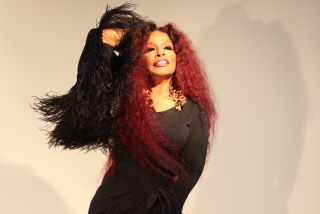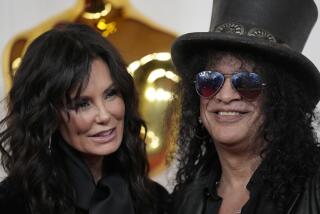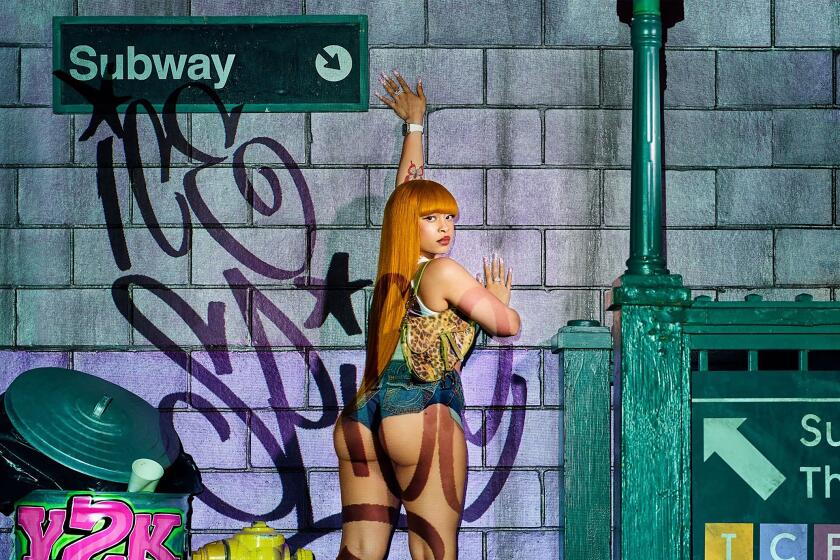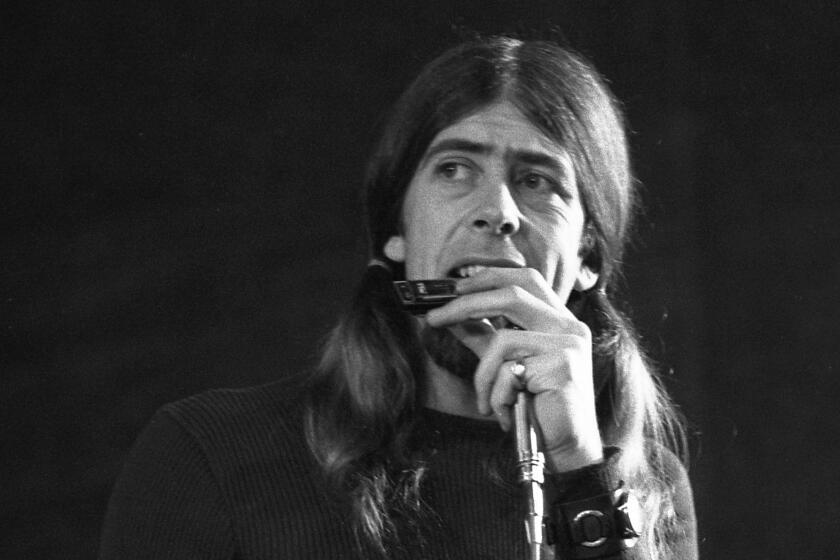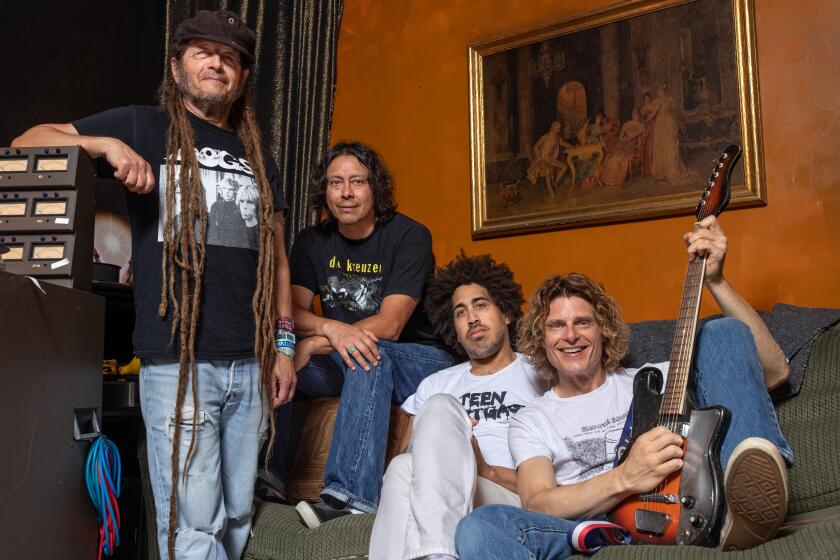O.C. POP MUSIC REVIEW : Trying to Rise Above It : Instances of Idiocy Mar Well-Staged ‘Board in O.C.’ Punk-Skate Event
To most of the world, the connection between rock music and skateboarding begins and ends with that wistful example of perfect Southern California maidenhood floating in slow motion against a perfect Southern California sky in Tom Petty’s “Free Fallin’ ” video.
The rock-skate connection made over the weekend in the Olympic Velodrome at Cal State Dominguez Hills involved nothing quite so elegant.
Punk rock, not Petty’s stately, chiming Rickenbackers, is the real soundtrack for skate culture: Orange County’s Offspring and the South Bay’s Pennywise being two hot Southland punk bands that, before KROQ started pumping punk hard last spring, had made legions of fans by lending their songs to soundtracks for skateboarding and snowboarding action videos.
Hence the “Board in Orange County” show on Saturday, followed by Sunday’s scheduled “Board in South Bay,” two 10-hour punk and ska programs with bands (30 in all on the main stage over the two days), mosh pits and, right next to the sound-mixing board on the Velodrome floor, a towering skateboarding ramp where helmeted riders soared or tumbled through the daylight hours.
“Board in Orange County” is what it said on Saturday’s tickets, but the official event T-shirts read, “Banned From Orange County,” the Saturday show having been moved hastily from UC Irvine when officials there had second thoughts about inviting in 10,000 punk fans.
Saturday’s festival, dominated by bands from O.C. and the historically allied Long Beach punk-alternative scene, was essentially a mellow, friendly and well-staged event, but it also had instances of the idiocy that threatens to send major punk concerts the way of major rap concerts--into the realm of the uninsurable and the nonexistent.
Campus police reported that two men were stabbed at the concert in separate fights; one refused treatment, while the other was taken to Harbor General Hospital with cuts on one arm. There were no arrests. Also, police said, a woman who fell during the show was knocked unconscious and taken to the hospital. Details were not available.
The day also was marred by a bizarre episode on stage. As singer-guitarist Trever Keith of Face to Face performed the band’s song, “Disconnected,” a man charged him from behind and sent the utterly unsuspecting rocker sprawling from the high stage. Keith emerged bruised but not seriously hurt from his steep fall. Face to Face stalked off in anger, but re-emerged to complete its set after a five-minute delay.
Later, backstage, a cooled-off Keith played down the incident, saying he didn’t know who had pushed him, although others backstage told him it who they thought it might be.
“The police were willing to take a report, but I didn’t think that it was necessary. It was just one of those misunderstandings,” he said. “People come to a show and have too much to drink. . . . It’s one of those punk rock things.”
Police confirmed only that the attacker was not a regular member of the audience but had worn a backstage pass. Sgt. Jack Peconic of the campus police said that Keith declined to press charges, and that his attacker was ejected from the concert at the request of the promoters.
Offspring’s singer, Bryan (Dexter) Holland, who was at the show, said in a backstage interview that “I didn’t see it, so I really don’t know” who the man was. “I’m really sorry it happened.”
*
All that scary weirdness did set the stage for the Victorville-based Face to Face to make a grand recovery. Keith returned to his customary mood of cheerful, nice-guy bonhomie, and led Face to Face through a roaring finish.
The band’s ability to rise above adversity made the embattled affirmations of its catchy anthems all the more convincing. Those charge-the-ramparts anthems sound too much alike, but this emerging band’s melodic knack and spirited playing could sustain it until it finds a second musical gear.
When Face to Face came on at dusk, some fans in the middle of the long, oval Velodrome saw Keith’s white muscle shirt, short brown hair and tattoo-covered arms and assumed it was Mike Ness of Social Distortion. The influence extends to musical style as well.
But Social Distortion, which hails from the first Orange County punk boom of 1979-81, made a persuasive case that the new punks--Face to Face or anybody else--are still a long way from supplanting this particular band of old ones.
S.D.’s set was the longest and by far the finest of the day, 55 minutes of dark majesty powered by a new drummer, Randy Carr, who played his first major gig with the band and helped Social Distortion churn and drive with impressive force and fresh suppleness.
Ness had a sizzling night as a guitarist, following in Neil Young’s footsteps with playing that isn’t fancy but hits with a biting tone without sacrificing lyricism.
S.D. devoted five of its 14 songs to new material intended for its next album. They held out promise that Ness, while not changing his customary direct, plain-spoken approach, is probing more vulnerable regions beneath the proud, swaggering surface he typically has presented.
One song was about the nature of strong friendship. Another, “Dear Lover,” hardly was the kind of title we’ve come to expect from Ness; but not to worry about softness setting in. Though pleading and desperate, the song rode a stormy surge recalling the electric “All Along the Watchtower.” It also found Ness trying, with some difficulty, to leap his foghorn voice to falsetto range--further evidence that he’s stretching a bit in an attempt to raise his band to another level.
*
Oldies were concentrated on S.D.’s early singles and its 1983 debut album, “Mommy’s Little Monster,” along with a fine reading of the 1988-vintage “Prison Bound” and “Lost Child.” He dedicated “Lost Child,” a lament for a kid who grows up without warmth and acceptance, “to myself and anyone else who grew up in a broken home.”
Jack Grisham, another hero of the local punk scene’s early days, led his new band, the Joykiller, through a blitzkrieg set of 12 songs from its new album. The strong, hook-filled material received a hard-charging treatment, and Grisham’s now theatrically drawling, now sharply insistent voice is utterly distinctive at a time when too many punk singers all sound alike.
But the story lines and character sketches that give some of the Joykiller’s songs their spark were lost between stage and audience.
By running the show at breakneck speed and never pausing to introduce the material, Grisham (adorned for the day in a black, long lady’s skirt and freshly shaven head) didn’t do much to help the material open up for listeners hearing it for the first time.
His familiar, caged-panther’s pacing across the stage robbed him of the chance to bring some of those stories and characters alive. It would have been better to alternate, as the moment requires, between bursts of energy and a fixed, storyteller’s stance that allows an audience to pick up on the facial expressions and body language that can put a song across.
Songwriting is a strong suit for Fluf, the San Diego/O.C. band fronted by singer-guitarist O (just O), whose round figure and graying beard qualify him as the Jerry Garcia of Southern California punk. The band offered good melodic refrains, thick, crunchy texture, and an occasional willingness to slow down and explore such softer subjects as friendship.
Fluf, headed for a big-label release with Atlantic, also had something to say in its solid, crunchy set about those familiar punk bugaboos, conformism and betrayed idealism. In keeping with the theme of friendship, O summoned Grisham to front Fluf for a rendition of “Superficial Love,” an anti-militarism tirade from Grisham’s early ‘80s band, T.S.O.L.
*
Also in the catchy punk-pop anthem category was Unwritten Law, a young San Diego band that sang simplistically about those aforementioned familiar punk bugaboos. The band isn’t distinctive, but it has youth and energy and a decent ear for tunes on its side. Pennywise’s singer, Jim Lindberg, turned up to sing on the apocalyptic “World War III.”
Finishing the long day for a thinned-out crowd, Sublime was a puzzler, offering sharp musicianship but a scattered way of deploying it. What stood out was Brad Nowell’s voice, and the deeply soulful uses he can put it to, if only for intermittent stretches until the band moves on to the next flavor in its mix-and-match stylistic blend of slow reggae, thrashing punk and quick-stepping ska.
Nowell, a blond, spike-haired beach kid, was easily the day’s purest singer, and at peak moments (such as the reggae-soul passages of the alcoholic lament, “Badfish,” the sparse “Pool Shark,” and the surging choruses of “STP”), he burrowed deeply into plaintive feelings, coloring the music emotionally with an extra husky touch here, a softened dynamic there.
In “Date Rape,” Sublime has been saddled with that curse of blessing, a novelty hit. Nowell seemed to want to move beyond that phase, flatly denying requests for the song (and going along with many a shouted plea to omit it). “You’re higher than I am if you think you’re gonna hear that (expletive),” Nowell told the crowd.
Instead, he serenaded his Dalmatian, Louie, who had the run of the stage. Earlier, joining No Doubt for a guest turn of “toaster” style rapping reggae during their song, “Total Hate,” Nowell turned his attention away from his glamorous duet partner, Gwen Stefani, and started singing to the dog, who rewarded his master by nipping at his pants.
No Doubt offered its characteristic grab bag of horn-punctuated ska and funk and metallic guitar rock, with a sarcastic new tune, “Just a Girl,” offering a stripped-down, punkish approach.
The Anaheim band got a good response from its loyal legion of fans, but Stefani’s bouncy theatrics and Monroe-by-way-of-Madonna look probably didn’t endear her to a horde of punkers wanting the hard, fast, tough stuff.
*
The day’s other ska entry, the Berkeley-based Dance Hall Crashers, came through with sprightly unison and call-and-response passages between alto Elyse Rogers and her high-range sidekick, Karina Schwartz. Some of it sounded like early Blondie, except with a skipping Jamaican rhythmic underpinning. Only “Shelly” had the melodic lift to make it memorable, but, like No Doubt’s set, it made for a good, peppy change of pace from punk ire.
The Vandals, another band with links to the old days of O.C. punk, carried on with its usual spoof-minded, slapstick shenanigans. Singer Dave Quackenbush’s voice wasn’t mixed well (on a day when most bands enjoyed excellent sound), so the incorrigible guitarist-singer Warren Fitzgerald stole the show.
Despite numerous pratfalls as they pointedly denied the audience the fix it craved of “real” punk, the Vandals more or less kept things together musically. The Offspring’s Dexter, whose Nitro label just released a new Vandals album, jumped in to play rhythm guitar on the venerable “Legend of Pat Brown.”
Another Nitro band, Guttermouth, trod the same clowning-punk turf as the Vandals, but with a lot less charm. Where the Vandals tweak an audience with their foolery, setting themselves up as objects of ridicule in traditional jester/class-clown fashion, Guttermouth’s stage humor tends to have fangs, but not charm or wit.
The Grabbers were a decent second-echelon punk band that played hard and got the moshers moving, but the band won’t progress unless it starts grabbing ears with improved tunefulness. Singer Tommy Macke was more interested in grabbing eyes with his see-through plastic shorts. Here was ultimate proof that nudity is not in itself sexy or even interesting.
Excel, a good, veteran L.A. metal band, was pretty much lost on this punk crowd, much of which used the band’s set for its lunch break. But Excel gamely played crisp, committed versions of psychodramatic songs from its upcoming album; fans of Tool and kindred acts should find it worthwhile.
CAPTION F7
More to Read
The biggest entertainment stories
Get our big stories about Hollywood, film, television, music, arts, culture and more right in your inbox as soon as they publish.
You may occasionally receive promotional content from the Los Angeles Times.
